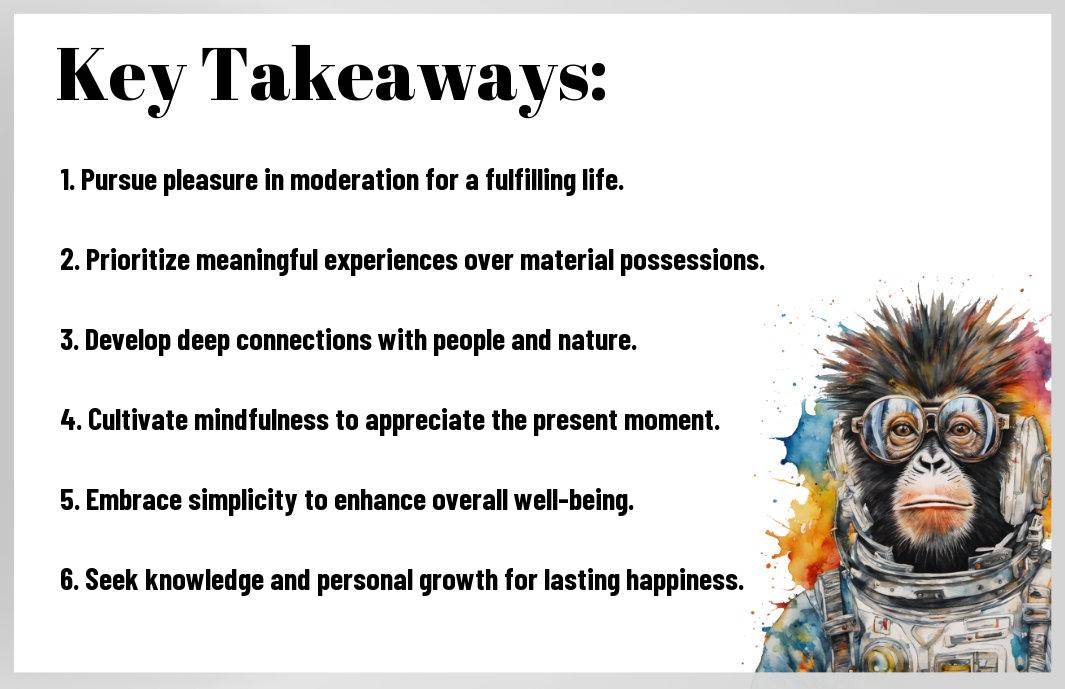
Newsletter Subscribe
Enter your email address below and subscribe to our newsletter

Enter your email address below and subscribe to our newsletter

Philosophy offers us diverse lenses through which we can view our lives, and Epicureanism invites us to rethink our understanding of success. I’ve often found myself caught in the hustle culture, where achievement is measured by accolades and wealth. However, by embracing Epicurean principles, I’ve discovered that true success lies in finding joy, fostering meaningful connections, and savoring life’s simple pleasures. Join me as I explore how we can redefine success together through this ancient yet refreshing perspective.


Before I look into the heart of Epicurean philosophy, I want to share why it resonates with me. This school of thought, founded by Epicurus in ancient Greece, emphasizes the pursuit of happiness as the ultimate goal of life. But what captures my interest the most is its nuanced approach to pleasure—not merely the fleeting joys of life, but rather a deeper understanding of what it means to live well and cultivate a fulfilling existence. It encourages you to seek pleasure wisely and to consider the long-term effects of your choices, making it a deeply reflective practice.
Behind the core tenets of Epicurean thought lies a simple yet profound idea: pleasure is the highest good, but it must be pursued thoughtfully and responsibly. I appreciate how Epicurus urged followers to distinguish between different types of pleasures, advocating for the pursuit of intellectual and emotional joys over mere physical ones. This emphasis on simplicity helps me focus on what truly enriches my life—connections, philosophical discussions, and personal growth—rather than getting swept away by momentary indulgences.
By exploring the landscape of Epicurean philosophy, we encounter insightful figures who laid the groundwork for this way of thinking. Epicurus himself stands as the most recognizable name, but there’s also the vibrant legacy of his students and followers. Their writings and thoughts continue to shed light on how we can live our lives in harmony with nature and our own desires.
The impact of Epicurus and his school is significant. For instance, figures like Lucretius brought the ideas of Epicureanism to life through poetry, making the principles more accessible and relatable to everyday people. As I engage with their works, I feel inspired to apply these age-old lessons to my modern life. It shows me that the journey toward a fulfilling existence is not uniquely contemporary; instead, it’s part of a broader, timeless conversation about what it means to lead a good life.

Some might argue that success is measured solely by material wealth and professional achievements. However, I believe that this narrow view can often lead us astray. As I research deeper into the Epicurean philosophy, it’s evident that true success is found in the joys of life, the fulfillment of our desires for happiness, and the richness of lived experiences. By shifting our focus from the societal definitions of achievement to a more personal understanding, we can start to cultivate a life that truly resonates with who we are and what brings us joy. It’s about finding the balance that allows us to savor life’s moments, rather than checking off boxes in a never-ending race to the top.
An imperative component of redefining success lies in prioritizing happiness over mere financial accumulation. I find that understanding what genuinely brings me joy is pivotal to pursuing a meaningful life. Instead of seeking out the next promotion or a hefty paycheck, I focus on experiences that resonate with my values and passions. This shift allows me to cultivate a sense of fulfillment that wealth alone couldn’t provide. For you, embracing this principle could mean opting for a day spent with loved ones or engaging in hobbies that spark joy, rather than banking more hours in the office. It’s about recognizing that happiness, satisfaction, and a sense of purpose are the true markers of success.
At the heart of a fulfilling life are the meaningful relationships we cultivate with others. I can’t emphasize enough how enriching my connections with family and friends have been in defining my sense of success. These relationships provide emotional support, joy, and a sense of belonging that no monetary accomplishment can replace. Engaging in deep conversations, sharing laughter, and being present for one another allows us to create priceless memories that forever shape our lives. Fostering these connections requires time and effort, but the rewards are immeasurable. I encourage you to invest in your relationships: show appreciation, open up, and create shared experiences that will flourish over time.
A meaningful relationship goes beyond mere acquaintance; it’s about forging connections that nourish your soul and stimulate personal growth. I often find that spending time with those who truly understand my values and aspirations enhances my sense of satisfaction in life. These relationships provide a safe space for vulnerability, laughter, and even constructive feedback. When you surround yourself with supportive, loving individuals, you’ll find that your journey toward success becomes enriched and more enjoyable. So, in your pursuit of what it means to succeed, consider nurturing the bonds that matter most in your life.
Your journey towards redefining success through Epicurean philosophy hinges on understanding the imperative role of pleasure. Contrary to popular belief, success isn’t solely about achievements or material wealth; it’s deeply intertwined with the experiences and feelings that bring joy and happiness into our lives. By embracing a more holistic view that includes pleasure, you can create a more fulfilling definition of what it means to be successful. In this context, it’s helpful to explore the different types of pleasure we can encounter.
| Type of Pleasure | Description |
| Sensory Pleasure | Enjoyment from your senses, like taste, sight, and sound. |
| Intellectual Pleasure | Joy derived from learning and engaging in thoughtful discussions. |
| Emotional Pleasure | Connection with others and heartfelt experiences. |
| Physical Pleasure | Enjoyment from movement, exercise, and bodily sensations. |
| Spiritual Pleasure | Inner peace and satisfaction that comes from your beliefs and practices. |
For a fulfilling life, balancing these pleasures is key. Too much focus on one type, perhaps sensory pleasure through indulgence, might lead to neglecting other areas that bring joy, like intellectual or emotional pleasures. It’s important to cultivate a rich tapestry of experiences that caters to all dimensions of pleasure. I find that when I consciously strike this balance, my sense of fulfillment deepens and my definition of success evolves.
Pleasures can come in small moments or grand experiences, and they don’t have to compete with one another. Instead of chasing after a rigid definition of success, I invite you to embrace the myriad ways pleasure surfaces in your life. Through this integrated approach, I have discovered that each type of pleasure can coexist beautifully, enriching my lifestyle and ultimately defining my own success.
Unlike the simpler times of the past, today’s definition of success is often entangled with societal expectations, material possessions, and a relentless pursuit for wealth. I find myself questioning how we can reclaim a more meaningful understanding of success amidst this clutter. The Epicurean philosophy, which emphasizes pleasure and joy derived from simple experiences, encourages us to navigate these modern challenges by focusing on what truly brings contentment rather than accumulating what is merely fashionable or desirable. For you, embracing this mindset may mean taking a step back and examining what genuinely fulfills you beyond mere financial milestones.
Overcoming the pressures of consumerism can be a demanding task in a world where advertisements bombard us daily, instilling a belief that happiness is just one purchase away. I’ve learned that embracing contentment requires a conscious choice to prioritize experiences and relationships over possessions. As I explore the Epicurean virtues, I realize that true fulfillment often lies in savoring moments—like sharing a meal with loved ones or enjoying the tranquility of a beautiful sunset—rather than in the fleeting joy that a shopping spree might bring. By recognizing the difference between fleeting satisfaction and lasting joy, I’ve been able to redefine what success means for me.
Modern life can feel overwhelmingly chaotic, often making it difficult to find a sense of peace. I find that the Epicurean approach teaches us to cultivate tranquility through mindfulness and simplicity, allowing us to tune into what truly matters. It’s not about distancing ourselves from the chaos, but rather about learning to navigate it with grace and purpose. In today’s fast-paced environment, I’ve discovered that taking time for self-care, establishing boundaries, and engaging in activities that nourish my soul can create a refuge amidst life’s storms.
It’s vital to carve out moments of stillness and reflection, where I can pause and breathe. By surrounding myself with positivity, practicing gratitude, and cherishing the little joys of life, I can create a personal sanctuary that helps me maintain my sense of purpose and fulfillment. Exploring practices like meditation or simply enjoying nature helps me recharge and fosters a profound sense of peace in these chaotic times. Through this lens, I begin to see that achieving success is really about cultivating a life where inner peace reigns supreme, even as the world spins on around us.
Now, when I think about how to practically apply Epicurean philosophy to daily life, I realize how simple yet transformative it can be. By focusing on daily habits that prioritize pleasure and well-being, I can enhance my overall joy. For instance, I try to carve out time each day for activities that bring me happiness, whether it’s reading a good book, enjoying a delicious meal, or spending time in nature. These little moments of pleasure accumulate, reminding me that a joyful life is built upon the small, everyday experiences I often take for granted. How about you? What small habits can you incorporate to elevate your day?
Against the backdrop of a busy life, I find solace in creating routines that feed my mind and soul. I prioritize mindfulness and gratitude, taking a few minutes each morning to appreciate what I have and visualize the day ahead. This practice not only sets a positive tone but also helps me stay focused on what truly matters. I also make it a point to cultivate my surroundings—surrounding myself with soothing colors and scents that spark joy can uplift my spirits. It’s fascinating how our environments influence our feelings, isn’t it?
Beside the individual pursuits of pleasure and happiness, I believe that cultivating a supportive community is vital for embracing the essence of Epicurean philosophy. Engaging with like-minded individuals can provide a sense of belonging and mutual enjoyment. I make an effort to connect with friends and family, sharing experiences that uplift and inspire one another. Whether it’s hosting potlucks, going for nature walks, or simply having deep conversations over coffee, these interactions enrich my life in ways that solo endeavors may not.
Philosophy teaches us that we are social beings, and fostering relationships is key to a fulfilling life. Surrounding myself with supportive friends can evoke a sense of belonging and shared joy. I cherish the moments spent connecting with others, whether through laughter or heart-to-heart talks. These bonds not only help us navigate life’s challenges but also amplify our pleasures. By nurturing such relationships, I’m continually reminded of the richness that a supportive community brings into my everyday existence.
With these considerations in mind, I find it refreshing to explore how Epicurean philosophy allows us to redefine success. Instead of chasing after external markers of achievement, we can focus on what genuinely brings us happiness and fulfillment. It’s about savoring life’s simple pleasures, whether through a beautifully prepared meal, the warmth of friendships, or the tranquility of a moment spent in nature. You may discover that success isn’t measured by a title, a salary, or possessions but rather by the richness of your experiences and the depth of your relationships.
If you’re curious to dive deeper into the foundations of this philosophy and embrace a more meaningful approach to success in your life, I encourage you to check out the Epicurean Basics – NewEpicurean. You might just find a path that resonates with your values and helps you craft a life filled with joy and satisfaction. After all, life is not just about achieving; it’s about experiencing and enjoying every moment along the way.
A: Epicurean philosophy, founded by the ancient Greek philosopher Epicurus, emphasizes the pursuit of happiness and pleasure as the ultimate goals in life. It advocates for a lifestyle that prioritizes simple pleasures, meaningful relationships, and the avoidance of pain and unnecessary desires. It teaches that true pleasure comes from knowledge, friendship, and cultivating a tranquil mind rather than material excess.
A: By applying Epicurean philosophy, one can shift the focus from conventional metrics of success, such as wealth and status, to a more holistic understanding of fulfillment. Success can be redefined as achieving a state of eudaimonia, which involves living a life of virtue, enjoying simple pleasures, and fostering genuine connections with others, leading to a deeper sense of satisfaction and well-being.
A: To incorporate Epicurean principles, start by identifying and indulging in small, attainable pleasures, such as savoring good food, spending time with loved ones, or engaging in activities that bring joy. Practice mindfulness by being present in each moment, appreciate the beauty of everyday experiences, and declutter your life of excess possessions and commitments that do not contribute to your happiness.
A: While hedonism focuses on the pursuit of pleasure as the highest good, often without consideration for consequences, Epicurean philosophy promotes a balanced approach that values moderation and sustainable pleasures. It emphasizes the importance of intellectual fulfillment, emotional well-being, and ethical living, encouraging individuals to seek pleasure that aligns with their long-term happiness and peace of mind.
A: Yes, Epicurean philosophy can be effectively applied in a professional context by redefining success in terms of workplace satisfaction, meaningful contributions, and positive relationships with colleagues. It encourages individuals to prioritize work-life balance, cultivate a supportive work environment, and focus on personal growth and fulfillment rather than solely chasing promotions or financial gain.
A: Understanding Epicurean philosophy can significantly enhance mental health by fostering a sense of contentment and reducing anxiety about external validation. By adopting a mindset focused on gratitude, present-moment awareness, and prioritizing relationships, individuals can alleviate stress, increase resilience, and cultivate a more peaceful and fulfilling life.
A: Absolutely! Epicurean philosophy can complement other belief systems and philosophies by promoting universal values such as well-being, community, and self-reflection. By integrating aspects of Epicurean thought with other teachings, individuals can create a personalized approach to success and happiness that resonates with their unique values and beliefs.